Three Day Ordeal with Baro-Chamber and Psychological Tests
Szöveg: László Szűcs | 2008. május 14. 6:30’Get among the best!’ – says the newest advertisement of the Hungarian Defence Forces on billboards along the roads, in metro carriages and various magazines. It is not too late! The deadline for applications is the 31st of May, so there is still some time left for those interested in the fighter pilot training.
Fortunately enough, there are a considerable number of people who have taken the first step and submitted their application forms. Most of them even completed their medical (aptitude) tests. Honvedelem.hu went to Kecskemét with a small group of applicants to report on their ordeals.
All those interested in the NATO Flying Training in Canada (NFTC) can contact the recruitment offices in the counties, HDF Aviation Training Department (RFO) based at Szolnok, or just visit www.nftc.hu on the internet for more information. Anybody who wants to be a fighter pilot can submit his/her application in a single step.
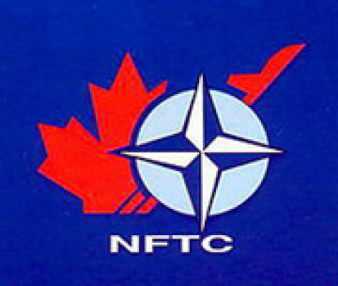
Of course, anyone who thinks that passing the medical test means that the worst part is over, is wrong. In the previous years from the 20 candidates who were invited to the application procedure not more than a dozen were admitted to the programme. There are applicants who do not even go to Szolnok, however, most of them had failed the entrance exam due to weak language skills, physical unfitness, or the lack of a degree.
The Candidates
Let’s pause here for a moment, for the young men and women who have applied for the NFTC programme have to pass the ’ordeals’ of the medical examination before taking the entrance exam … Tuesday, the 6th of May, 8.00 am. There are five young people chatting in the hall of the Medical Examination and Research Institute of HDF ’Dr György Radó’ Honvéd Medical Centre in Kecskemét. They are the candidates, all of whom have come to take the aptitude test. We have a few minutes until start, so we engage in a conversation.
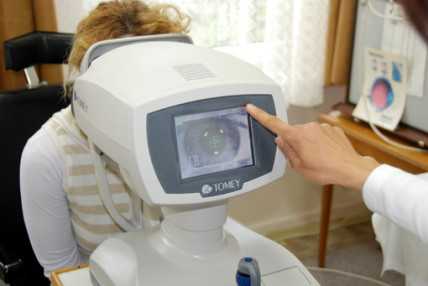
Ms Vanda Tomcsik lives in this town, therefore she arrived only a few minutes ago, as opposed to those who came to the institute from a greater distance, which means they have to spend the night in Kecskemét. Latecomers cannot participate in the examinations. The 25-year-old lady applied to the NFTC programme last summer and started the 3-day aptitude tests, but she learned soon enough that she is not fit for fighter pilot because of her physique, thus she cannot earn medical qualification 1/A.
"Neither my weight or my height were a problem, but I have found out that the length of my arms and legs, and my so-called seating height are not what they should be, or to be more specific, there wouldn’t be enough space for me in the cockpit of a fighter aircraft. This was the reason why I got category 1/B back then, which allows me to fly transport aircrafts or rotary wing aircrafts" – says Vanda, who received another notification recently: in case she would like to continue with the aptitude tests, she is welcome at the institute … Last November they did not deal with 1/B category candidates, but from this year on they are eligible to participate in the NFTC programme, even though they cannot be fighter pilots.
Vanda, who earned a BSc in International Studies from János Kodolányi College, would like to be a helicopter pilot and she hopes she will pass the 3-day medical examination with success.
The other female member of the team of 5 is Ms Melinda Rumi, aged 25. The young woman who lives in Pér, Gyõr-Moson-Somogy county applied on 6 December 2007 at the Gyõr recruitment office. As she tells me, she couldn’t find employment after her graduation from Berzsenyi Dániel College of Szombathely as a school teacher, so she thought she should apply for the NFTC programme. A few weeks later she received a note inviting her for medical examinations, but unfortunately, she was told that she can get category 1/B at the most, due to the proportions of her body.
"They contacted me again, so here I am, hoping that I’ll be eligible" – trusts Melinda, who – although she lives close to the airport of Pér – has never flown in her life.
Dávid Szentendrei is here for the second time, just like Melinda. The 21-year-old young man from Kiskõrös is a fourth year student of Zrínyi Miklós University of National Defence, he studies at the Faculty of Aircraft Armaments and Weapon Techniques of the Szolnok-based Aircraft and Air Defence Institute. His state examination is due in June, and initially he will be positioned with the transport helicopter battalion of HDF 86th Szolnok Helicopter Base. He applied to the NFTC programme last September.
"I have no problem at all with my future profession, but of course, I would rather become a pilot. Though I was told last year on the aptitude examinations that I have a slight deflection in my spine, therefore the highest qualification I can get is 1/B. Then they suspended the tests, which will continue now. I really hope that I can pass them and fly a helicopter in a few years’ time" – tells me Dávid.
Szabolcs Rokolya, who lives in Budapest, applied to the pilot training programme on the internet last April. The young safety engineer, aged 25, has always wanted to get a taste of military aviation. And he strongly believes that he will be eligible in the medical examinations.
Balázs Pozsár, 26, is from Budapest, too. He applied electronically roughly a month ago. Balázs graduated from the Budapest University of Technology as an IT specialist, and he was interested in aviation even as a child. He feels he would do a good job as a fighter pilot.
The Examinations
An assistant dressed in white interrupts our conversation – it’s time to go. The candidates will get their spine and chest x-rayed first, then there are various ultrasound tests. These will be followed by psychological tests, which take almost the whole day. Since Melinda had taken most of the tests earlier, she has to visit the ophthalmology, otolaryngology, and the internal medicine wards now. The rest of the team ’line up’ and set off for the psychological ward.
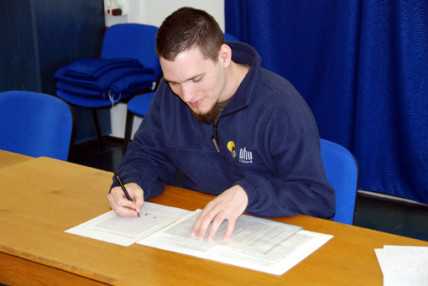
Dr (MD) Zsolt Pászti, the lead physician of the examination team tells me that from the 3-day-long aptitude test, ’psychological’ and preliminary image examinations take almost a whole day. All this happens with a purpose, since a fighter pilot has to be in perfect condition both physically and mentally. And this can be assessed only by half a dozen written and instrumental tests. Dr Pászti notes that in spite of the fact that only a few people fail on the psychological tests, there are candidates who haven’t even thought that in certain situations it may occur that a pilot has to take the life of a person, and when they are faced with this possibility they realize it is too much to bear mentally. Therefore they do not meet the requirements. This is exactly why the expert believes that those candidates who apply for the programme from a military environment and/or have some experience in aviation start out the aptitude and admission procedures from a more advantageous position.
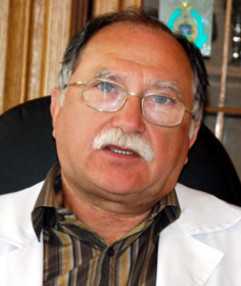
In the course of the 3-day-long ’ordeal’ each candidate is examined from ’head to toe’, since only the perfectly healthy can be fighter pilots. The criteria are listed in a special command and there cannot be any discrepancies, for example those who weigh more than 89 kilograms (the maximum load capacity of catapult seats on aircrafts) and are taller than 180 centimetres (meaning there is not enough space for them in the cockpit) cannot become fighter pilots. Of course, the anthropometric ratios also play a decisive part and it often happens that a candidate who is within the weight and height limit does not fulfil the requirements due to the size of the limbs.
In addition to the above listed examinations, there is more to assess suitability. The 3-day procedure ends with testing under load and resistance to anoxia, the so-called baro-chamber examinations. Only those will be graded 1/A or 1/B who pass all these tests. According to the Head Physician the data of the previous years clearly indicate that only 10–12 percent of the candidates are fit for aircraft pilot. Most of them fail because of a minor or major congenital spine deflection, but many are unsuitable because of eye or psychological issues.
While we are talking an assistant enters the office of Dr Pozsgai. She has bad news: the results of the spine x-ray. Unfortunately, Vanda and Szabolcs do not qualify because the size of the deflection in their spinal column exceeds the allowed limit. Therefore they do not even have to finish their psychological tests and may leave for home.
"You can see it for yourself now – this is a very tough examination indeed!" – sums up the results Colonel Pozsgai.
The Institute
Following the inquiry about the examinations, the right thing I should do is to get acquainted with the Institute, as well. The Flight Surgery, Medical Examination and Research Institute of Kecskemét was founded last summer in the framework of the military health reform. The Kecskemét military hospital closed down and the institute merged with the organization of the Honvéd Medical Centre (HEK) – informs me Dr (MD) Gábor Szabó, retired Medical Colonel, the Director of the Institute.
The reform put an end to hospital services, but there is still an operating ward providing out-patient services. Naturally, the specialist practices are open for eligible soldiers living in or nearby Kecskemét and their family members, but in addition to that, the civilians living in the administrative capital of the county and in the agglomeration can also turn to the institute.
The other organizational unit of the institute, the Aviation Aptitude Test Department performs the regular aptitude examinations of HDF staff in air crew positions, engineering positions, parachuters, and divers. The Flight Surgeons’ Committee (ROB) aptitude certificate is issued for exactly one year for air crew, which means they have to complete the full examination procedure each year. The Director also tells me that beyond testing and examining aviators, the tasks of the department also involve the assessment of NFTC candidates’ individual suitability. Moreover, the department is an accredited pilot aptitude testing facility.
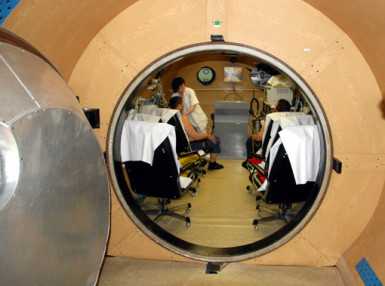
The Military Aptitude Test Department is a new feature, the necessary human resources were recruited last year. On HDF-level, staff aptitude tests are carried out only at the HEK’s Preventive Directorate and in Kecskemét. The institute led by Colonel Szabó performs screening tests for the senior staff of the HDF and the Ministry, the students of Zrínyi Miklós University of National Defence and the Non-Commissioned Officers’ Training School of Szentendre, furthermore soldiers preparing for NATO positions and their families.
The Colonel also tells me that the experts of the Height, Physiological and Functional Diagnostic Department carry out the baro-chamber tests, and complete cardiovascular examinations as well, which are essential in out-patient health care.
The youngest organizational unit of the insitute is the one-day surgery ward, the operations licence of which was issued on 1st January of the present year. At the moment only 60 percent of its capacity can be utilized, but the Director is optimistic and says that this ratio will improve in the near future.